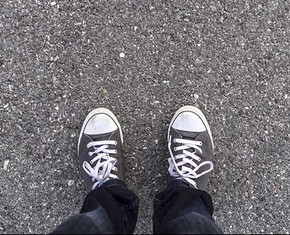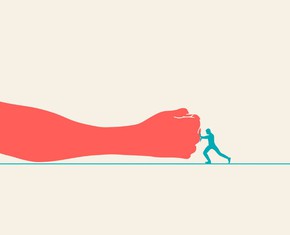The views expressed in our content reflect individual perspectives and do not represent the authoritative views of the Baha'i Faith.
My husband and I live on the edge of a National Park in Sydney, Australia, where at least 20-30 people reside in the park in tents or caves, suffering through the harshest of conditions.
We have been fortunate to meet some of these homeless people over the years. One person, Darren, who had lived in the park for over 20 years, became a wonderful friend. Darren offered to paint our house. He would often have a meal with us, do his washing, and sleep in our home when the rain was bucketing down.
RELATED: Can Spirituality Solve the Disparity Between Rich and Poor?
We often pray for these unfortunate people living in these tough conditions and have long wondered how we could help them all in more practical ways. We’ve been inspired to try to help by this passage from Baha’u’llah, the prophet and founder of the Baha’i Faith:
Know ye that the poor are the trust of God in your midst. Watch that ye betray not His trust, that ye deal not unjustly with them and that ye walk not in the ways of the treacherous. Ye will most certainly be called upon to answer for His trust on the day when the Balance of Justice shall be set, the day when unto every one shall be rendered his due, when the doings of all men, be they rich or poor, shall be weighed.
Our efforts began through a friendship we had developed with the local branch of the Salvation Army. We suggested to them that they take over a thrift shop that was closing down in the small local shopping center. The lady who had the shop — Sandra, a selfless soul who has catered to the needs of the poor and homeless for years — then gave it to the Salvation Army when they agreed to take it over from her.
In the old thrift shop area, the Salvation Army is now setting up a beautiful space for these homeless people to feed and counsel them, a welcoming place where they can have a shower and wash their clothes. This new effort reminds us of Abdu’l-Baha’s advice about reaching out to help the poor from a talk he gave in New York in 1912:
What could be better before God than thinking of the poor? For the poor are beloved by our heavenly Father. When His Holiness Christ came upon the earth those who believed in him and followed him were the poor and lowly, showing the poor were near to God. When a rich man believes and follows the Manifestation of God it is a proof that his wealth is not an obstacle and does not prevent him from attaining the pathway of salvation. After he has been tested and tried it will be seen whether his possessions are a hindrance in his religious life. But the poor are especially beloved of God. Their lives are full of difficulties, their trials continual, their hopes are in God alone. Therefore you must assist the poor as much as possible, even by sacrifice of yourself. No deed of man is greater before God than helping the poor. Spiritual conditions are not dependent upon the possession of worldly treasures or the absence of them. When physically destitute, spiritual thoughts are more likely. Poverty is stimulus toward God. Each one of you must have great consideration for the poor and render them assistance. Organize in an effort to help them and prevent increase of poverty. The greatest means for prevention is that whereby the laws of the community will be so framed and enacted that it will not be possible for a few to be millionaires and many destitute.
One of Baha’u’llah’s teachings is the adjustment of means of livelihood in human society. Under this adjustment there can be no extremes in human conditions as regards wealth and sustenance. For the community needs financier, farmer merchant and laborer just as an army must be composed of commander, officers and privates. All cannot be commanders; all cannot be officers or privates. Each in his station in the social fabric must be competent; each in his function according to ability; but justness of opportunity for all.
Of course, the Baha’i teachings say, we all need to implement some practical ways we can “assist the poor as much as possible.” Here are just a few suggestions that my husband and I have tried:
- Buy a takeout meal for someone hungry
- Go to the Salvation Army or any other charitable organization in your area that helps poor people, and tell them you’d like to volunteer
- Smile and be friendly to the homeless people you meet — take them a warm jumper or a blanket; give them an inspiring book to read; or just sit down and talk to them.
- Ultimately, just ask — is there anything I could do for you?
A Gift of Trousers
In his book “Portals to Freedom,” author and early Baha’i Howard Colby Ives recounts this episode from Abdu’l-Baha’s life and one of his many efforts to help the neediest among us:
While Abdu’l-Baha was in Dublin, He stayed at a small inn. A woman staying at the same inn tells this story:
Early one morning while she was dressing and happening to glance out of the window she saw Abdu’l-Baha pacing up and down dictating to His secretary. As he watched, an old man in very dirty, ragged clothes walked past the inn. Abdu’l- Baha sent His secretary to call him back.
As the man approached, Abdu’l-Baha went forward to greet him. He took the poor man’s hand in His and smiled into his face as though He were welcoming an old friend. He talked to him for a few minutes, trying to make the old man feel more cheerful. Finally, the man did smile a little, but it was rather sad. While Abdu’l Baha talked to him, He looked the man over. He noticed that his trousers were very torn and scarcely covered his body. He said, “We must do something about that.”
The street was empty because it was very early in the morning. With a gentle laugh, Abdu’l-Baha stepped into the shadow of the wall and began to fumble under His cloak. Then He stooped and His trousers fell to the ground. He pulled His cloak around Him and, turning to the old man, He handed him His trousers.
“May God go with you,” He said. And with that He turned to His secretary and continued dictating as if nothing unusual had happened.
RELATED: How the Rich Are Accepting the Baha’i Call to Help the Poor
I wonder what that man thought as he went his way — perhaps this glimpse into a world in which someone cared enough for him to give him his own pants marked a turning point in his life and transformed him.
A few days after leaving Dublin, Abdu’l-Baha wrote a letter to his host:
To be fruitless in the world of humanity is the manifest loss. A wise person will not attach his heart to ephemeral things: nay, rather, will he continually seek immortal life and strive to obtain eternal happiness.
Imagine how the world would change if we were all like this.
















Comments
Sign in or create an account
Continue with Googleor